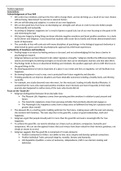Positive Approach
Assumptions
Acknowledgement of Free Will
We control our emotions and have the free will to change them, and we do things as a result of our own choices
without being ‘determined’ by internal or external factors.
We are self-directing and adaptive, in control of our own happiness.
We can live good lives if we focus on developing our strengths and virtues in order to become better people
both inwardly and outwardly.
According to Seligman, happiness isn’t a result of genes or good luck, but of our own focusing on the good in life
and minimising the bad.
We become happy by doing things we know alleviate negative emotions and boost positive emotions. In a study
by Ed Diener and Seligman, it was found that students with closer ties to family and friends demonstrated lower
levels of depression.
The centrality of free will contrasts with many disciplines of psychology: In the biological approach behaviour is
determined by genes and in the psychodynamic approach by child hood experiences.
Authenticity of Goodness and Excellence
Feeling happy is as natural as feeling anxious or stressed, and not acknowledging this has been a barrier in
psychological research.
Seligman believes we have inherent traits called ‘signature strengths.’ Seligman clarifies the difference between
talents and strengths by defining strengths as moral traits that can be developed, learned, and that take effort.
Psychology tends to focus on disordered thinking and mindsets; the positive approach aims to shift this focus to
the good things in life.
By allowing goodness to hold as important of a place in our minds and lives as negativity, we will facilitate true
happiness.
By viewing happiness in such a way, one is protected from future negativity and disorder.
Thinking positively can improve situations and have desirable outcomes including a healthy body, and thriving
social life.
For example, one study observed nuns who were, for the most part, leading virtually identical lifestyles. It
seemed that the nuns who expressed positive emotions more intensely and more frequently in their daily
journals also happened to outlive many of the nuns who clearly did not
Focus on the ‘Good Life’
Seligman distinguished between three desirable lives:
The Pleasant Life: Happiness comes from pursuing positive emotions in relation to past present and
future.
The Good Life: Happiness comes from pursuing activities that positively absorb and engage us.
The Meaningful Life: Happiness comes from a deep sense of fulfilment by living for a purpose much
greater than oneself.
The pleasant life is a starting point, building optimism for the future, making peace with the past and viewing
the moment with fondness. The next step then is the good life, a place of good relationships, work and
happiness.
Seligman urged that people should push for more than the good life and seek a meaningful life for true
happiness.
To achieve the good life, we need to develop our virtues such as altruism, compassion, humanity and
temperance. We can see throughout history that such virtues have been valued for their intrinsic goodness, not
simply as means to an end.
Seligman suggests that the good life is comprised of 3 main elements:
Positive Connection to Others: our ability to love, trust, forgive and develop spiritual connections.
Positive Individual Traits: personal integrity, morality, bravery and humanity.
Life Regulation Qualities: a sense of autonomy, independence, faith in our decision making and
behaviour.
, Relationship Formation
Authenticity of Goodness and Excellence
Feelings of love, kindness and forgiveness are authentic, and this can explain why we form relationships.
Entering into and developing relationships allows individuals to develop their ‘signature strengths’. In turn,
individuals will strive toward a happier and more contented life.
We are socially programmed to work hard to find and build relationships with others, and in turn positive
relationships contribute substantially to happiness.
The R in Seligman’s PERMA theory stands for Relationships, one of the building blocks which contribute to our
overall wellbeing.
Immersive, enjoyable experiences with our friends emphasise the authenticity of goodness as in these
situations, such as parties where we are overwhelmed with happiness and a sense of belonging.
The Good Life
Seligman suggests that one of the elements of the good life is ‘positive connection to others.’ This encompasses
out love, trust and forgiveness towards other people, all of which improve our overall happiness when
developed.
Happiness and the good life come from pursuing which absorb and engage us, something which the entirety of a
positive relationship will do. We become besotted with the other person in romantic relationships, and we can
engage in enjoyable activities with our friends.
According to a study by the Pew Research Centre (2005) 43% of married respondents said they were ‘very
happy’ compared with 24% of unmarried respondents.
Flow makes us happier. Flow is the term used when you're completely immersed in an activity. Relationships
trigger you to have more 'flow' moments which have a significant impact on your happiness.
Forming Friendships
As humans we seek friendships for a number of reasons, including the way we are able to express our authentic
selves and develop signature strengths such as altruism and kindness.
Rewards from act as a buffer during difficulties throughout life, for instance speaking to a friend can alleviate
feelings of stress and loneliness.
Positive psychology says that friendships are one of the key ingredients to happiness as they cultivate an
environment for developing our virtues and in turn this boosts our physical and mental health.
Therapy
Application of Assumptions and Background
Experiencing greater life satisfaction by promoting the authenticity of positive areas.
A central focus on increasing happiness and optimism, our natural traits, in order to improve quality of life.
Also works on the assumption that we have free will over our thoughts, feelings and behaviours and that people
with mental health disorders who perhaps feel a lack of control, can feel better through taking hold of this free
will.
Humans are self regulating and can develop our strengths; QoLT teaches that happiness is a choice, and its basic
aim is to demonstrate how people can choose happiness and ultimately have better relationships, better health
and success.
Positive emotions are as valid as negative emotions and while it is important to deal with the negative, the
positive shouldn’t be over looked. Our natural positive emotions can provide resilience and coping strategies
when developed.
Michael Frisch developed QoLT in 2006 with a whole life perspective, integrating principles from CBT into
positive approach assumptions.
The Quality of Life Inventory





